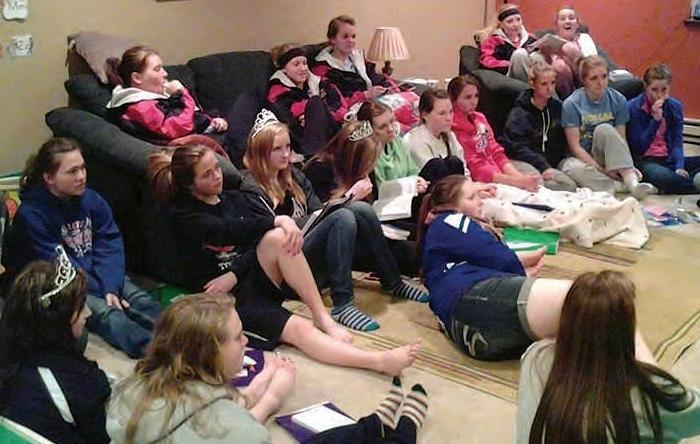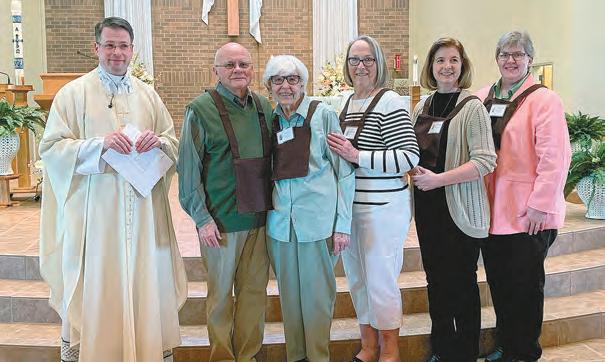
16 minute read
Continued on
faith life Should suffering shake our faith or draw us into deeper mystery of God’s love?
by Bishop Robert Barron Premier Christian Radio in the UK just sponsored a survey that investigated how the COVID crisis has affected religious beliefs and attitudes. There were three major findings – namely, that 67% of those who characterize themselves as “religious” found their belief in God challenged, that almost a quarter of all those questioned said that the pandemic made them more fearful of death, and that around a third of those surveyed said that their prayer life had been affected by the crisis. Justin Brierley, who hosts the popular program Unbelievable?, commented that he was especially impressed by the substantial number of those who, due to COVID, have experienced difficulty believing in a loving God. I should like to focus on this finding as well. Of course, in one sense, I understand the problem. An altogether standard objection to belief in God is human suffering, especially when it is visited upon the innocent. The apologist for atheism or naturalism quite readily asks the believer, “How could you possibly assert the existence of a loving God given the Holocaust, school shootings, tsunamis that kill hundreds of thousands of people, pandemics, etc.?” But I must confess that, in another sense, I find this argument from evil utterly unconvincing, and I say this precisely as a Catholic bishop – that is, as someone who holds and teaches the doctrine of God that comes from the Bible. For I don’t think that anyone who reads the Scriptures carefully could ever conclude that belief in a loving God is somehow incompatible with suffering. There is no question that God loves Noah, and yet he puts Noah through the unspeakably trying ordeal of a flood that wipes out almost all of life on the earth. It is without doubt that God loves Abraham, and yet he asks that patriarch to sacrifice, with his own hand, his beloved son Isaac. More than almost anyone else in the biblical tradition, God loves Moses, and yet he prevents the great liberator from entering into the Promised Land. David is a man after the Lord’s own heart, the sweet singer of the house of Israel, and yet God punishes David for his adultery and his conspiracy to murder. Jeremiah is specially chosen by God to speak the divine word, and yet the prophet ends up rejected and sent into exile. The people Israel is God’s uniquely chosen race, his royal priesthood, and yet God permits Israel to be enslaved, exiled, and brutalized by her enemies. And bringing this dynamic to full expression, God delivers his only-begotten Son to be tortured to death on a cross.
Advertisement
Once again, the point, anomalous indeed to both believers and nonbelievers today, is that the biblical authors saw no contradiction whatsoever between affirming the existence of a loving God and the fact of human suffering, even unmerited human suffering. Rather, they appreciated it as, mysteriously enough, an ingredient in the plan of God, and they proposed various schemata for understanding this. For instance, sometimes, they speculated, suffering is visited upon us as punishment for sin. Other times, it might be a means by which God effects a spiritual purification in his people. Still other times, it might be the only way that, given the conditions of a finite universe, God could bring about certain goods. But they also acknowledged that, more often than not, we just don’t know how suffering fits into God’s designs, and this is precisely because our finite and historically conditioned minds could not, even in principle, comprehend the intentions and purposes of an infinite mind, which is concerned with the whole of space and time. Practically the entire burden of the book of Job is to show this. When Job protests against what he takes to be the massive injustice of his sufferings, God responds with a lengthy speech, reminding Job of how much of God’s purposes his humble human servant does not know: “Where were you when I laid the foundations of the earth . . .?”
Once again, whether they halfunderstood the purpose of human suffering or understood it not at all, no biblical author was tempted to say that said evil is incompatible with the existence of a loving God. To be sure, they lamented and complained, but the recipient of the lamentation and complaint was none other than the God who, they firmly believed, loved them. I don’t for a moment doubt that many feel today that suffering poses an insurmountable obstacle to belief in God, but I remain convinced that this feeling is a function of the fact that religious leaders have been rather inept at teaching the biblical doctrine of God. For if human suffering undermines your belief in God, then, quite simply, you were not believing in the God presented by the Bible. I want to be clear that none of the above is meant to make light of the awful experience of suffering or cavalierly to dismiss the intellectual tensions that it produces. But it is indeed my intention to invite people into a deeper encounter with the mystery of God. Like Jacob who wrestled all night with the angel, we must not give up on God but rather struggle with him. Our suffering shouldn’t lead us to dismiss the divine love, but rather to appreciate it as stranger than we ever imagined. It is perfectly understandable that, like Job, we might shout our protest against God, but then, like that great spiritual hero, we must be willing to hear the Voice that answers us from the whirlwind.
Editor’s note: Bishop Barron is auxiliary bishop of the Archdiocese of Los Angeles and founder of Word on Fire, www.wordonfire.org.
Mass obligation
(Continued from page 1.)
–Those who are ill or have reason to believe their health would be significantly compromised if they were to contract a communicable illness; –Those who exhibit flu-like symptoms; –Those who believe they were exposed to the coronavirus or another serious or contagious illness; –Those who care for the sick, homebound, or infirmed; –Those who are pregnant or are 65 years of age or older (per the
CDC’s recommendation for high risk individuals); –Those who cannot attend Mass through no fault of their own; or –Those who have significant fear or anxiety of becoming ill by being at Mass. The statement said: “Those within these categories must still observe the Lord’s Day and are encouraged to spend time in prayer on Sunday, meditating on the Lord’s passion, death, and resurrection; an excellent way to do this is by praying the Liturgy of the Hours and participating in a broadcast/livestream of the Sunday Mass.” Referring to the return of the faith family to Mass as a “joyous occasion,” the bishops and administrators encouraged the faithful to post on social media about their return-to-Mass worship experiences using the hashtag #backtomassmn. Editor’s note: Answers to frequently asked questions and a portal to each Minnesota diocese’s protocols can be found at www. backtomassmn.org. To read the Statement in its entirety, visit the Diocese of New Ulm website, www.dnu.org.
Works of Mercy show God’s love in action
GRACEVILLE – After a lesson on the Works of Mercy, Julie Hendricks’ 5th and 6th grade religion class at the Church of the Holy Rosary in Graceville were excited to help others.The students chose several projects that would assist others with basic needs.
The projects included helping out on a frigid December morning with a food distribution for those in need, making fleece blankets and care packages for the homeless in the Fargo/ Moorhead area, and assembling Christmas care packages for the area retirement home residents. The students also made “window” visits to the residents due to COVID restrictions. One of several Works of Mercy projects accomplished by Julie Hendricks’ 5th and 6th grade religion class students this past academic year was making fleece blankets for the homeless in the Fargo/Moorhead area. (Photo submitted)

“In today’s world, we often get too busy to give the Works of Mercy much thought,” said Hendricks. “God has blessed us with an abundant world and many of us with a blessed life. We all need to take the example of these young people and look for ways to stretch our souls and open our hearts to charity.”
around the diocese Chastity ministry helps young women explore Christ’s divine love for them
by Katie Roiger Prairie Catholic correspondent
MURDOCK – Two sisters-in-law are encouraging young women like themselves to embrace chastity by showing them their dignity and worth as beloved daughters of God.
Samantha Johnson, a member of Sacred Heart parish in Murdock, first experienced that message about chastity as a ninth grader. She was invited to attend Young Christian Women’s Group, a weekly non-denominational group for young women facilitated by fellow parishioner Jess Collins. The group discussed the idea of holy human love as drawn from St. John Paul II’s “Theology of the Body” which explores chastity, marriage, and celibacy. After attending the meetings for a month, Samantha was blown away by the realization of God’s love for her and his perfect plan for her life.
“It completely changed my life,” said Samantha. “It’s very genuine when I say that.”
Several years later, when Collins was no longer able to conduct the meetings due to family commitments, Samantha felt called to take over the group. She recruited her sister-in-law and fellow Sacred Heart parishioner, Katie Johnson, to help spread the group's message to a new generation of young women.
“We thought that we should start a Catholic one (young women’s group) and essentially do the same thing,” said Samantha. “We could introduce the saints, the beauty of our Catholic faith, and the idea of receiving grace through Sacraments. The saints were in the same situation as we are; they experienced the same temptations, and we can look to them as role models.”
The women named their new Catholic initiative, Called for More. The ministry was approved in 2017 by then-bishop of New Ulm, Bishop John M. LeVoir. Just like its predecessor ministry, Called for More is rooted in the idea of young women’s inherent worth.
“It’s such an important message to tell young women about their worth and dignity in Christ,” Katie said. “Jesus loves us no matter what. We don’t have to try to be the best athlete or the smartest kid at school or the prettiest to get his love. It’s sad, but I think that most young girls don’t know that.” The women tie that message to the idea of holy marital love and the benefits of chastity. “Many times, women go looking for love in all the wrong places,” said Samantha. “We want to be loved, and we will go to all of these measures, and it seems like love, but it’s not. If a guy is pressuring you to do things with him, then it’s not love.”

Called for More in the Diocese of New Ulm was approved by Bishop John M. LeVoir in 2017. Geared toward young women, the ministry offers talks and retreats that emphasize young women’s inherent worth and dignity in Christ. (Photo submitted)
Although the two women bring a Catholic perspective to their sessions, they also emphasize the science behind the practice of chastity. Each talk or retreat discusses verified statistics and studies which show the benefits of waiting until marriage to have sex, the consequences of birth control and sexually transmitted diseases, and much more.
“We want to show that the science [of relationships] points to the fact that God knew what he was doing," said Katie. “God doesn’t make mistakes. He gave us something that he knows will make our hearts happy. However, if we don’t follow his plan, we set ourselves up for heartache.”
If the timeline allows, there will be a fun movie night, complete with cozy blankets and snacks. Another favorite tradition is having the girls write letters to their future husbands. “It’s one of the girls’ favorite things,” Samantha said. “The idea is that you give your husband the letters one day.” Called for More is offered to both parishes and schools throughout the Diocese of New Ulm, and the women are very flexible regarding scheduling. There is a range of options, including speaker nights, day-long or weekend-long retreats, and weeknight gatherings of one night per week for four to five weeks. Each talk is customizable and can even focus on different topics. Financial assistance available. Parishes and schools interested in the Called for More ministry are encouraged to apply for the Catholic United Financial Chastity Grant, which can provide up to $1,000 of financial assistance. The women are happy to work with those interested in pursuing the grant. “We have a pretty good presence established in our local community, but there’s so many more people who need to hear this message besides our local girls,” Katie said. “Our hope is to start within the diocese of New Ulm and just spread the word.”
For more information on Called for More visit https:// calledformore.com/.
Growing in union with God as a Third Order Secular
SPICER – The Our Lady of Divine Mercy Chapter has been meeting at Our Lady of the Lakes Catholic Church in Spicer since 2011 and has 17 members in different stages of its formation. The Order is associated with the Order of Discalced Carmelites, whose spirituality is based on the writings of St. Teresa of Avila, St. John of the Cross, St. Therese of Lisieux, and other notable Carmelite saints.
The Secular Order of Discalced Carmelites is what in past years was referred to as a “third order” or lay group of Catholics that is formally established to associate themselves with a specific religious community, and to develop their spirituality and life, as much as possible, in the model of the particular religious community. To be a Secular Carmelite involves a commitment of one day a month to come together with other group members to pray and study. It also involves a daily commitment of 30 minutes of mental prayer and Rosary, spiritual reading, study, daily Mass (if possible). For more information contact Jane Gahlon at jgahlon@gahlon.com.

Members of the Our Lady of Divine Mercy Secular Order of Discalced Carmelites who were received into the formation or made promises on Sunday, May 16, 2021, at Our Lady of the Lakes Church are pictured l-r, Fr. Mark Steffl, spiritual assistant to the group, Ed Green who was received into formation, Mickey Wallin and Maggie Fletcher who made definitive promises, and Anita Hormann and Lynn Halbakken-Taffe who made temporary promises. (Photo submitted)
NFP Awareness Week July 25-31
In 2008, as the 40th anniversary of Pope Paul VI’s 1968 encyclical Humanae Vitae approached, the U.S. Conference of Catholic Bishops (USCCB) launched “Natural Family Planning Awareness Week,” an educational campaign that celebrates God’s vision for marriage and articulates Catholic teaching about human sexuality, marital love, and responsible parenthood. This year the awareness week will be observed July 25-31. Natural Family Planning (NFP) is a general title for ethical, natural, safe, and effective methods for both achieving and avoiding pregnancy in marriage. Through NFP, a woman learns to understand her body’s natural monthly cycle. By tracking the signs of her fertility each day, she can determine when she is fertile and infertile. The NFP methods are free from the host of side effects and health risks accompanying hormonal contraception. They don’t pollute the environment and they can even help women identify underlying health problems that may otherwise go undiagnosed.

The Diocese of New Ulm Office of Family Life joins with the U.S. bishops in highlighting the benefits of NFP as ethical methods to help married couples live God’s design for their marriages. Want to learn more about the methods of NFP offered in our diocese? Visit www.dnu. org/nfp.

SLEEPY EYE –
Mary Gangelhoff,
principal at St. Mary’s Catholic Elementary School in Sleepy Eye is the recipient of the 2021 Minnesota Independent School Forum (MISF) Leadership Award. MISF Leadership Awards recognize the hard work and dedication of school leaders who instill passion in people they work with, bring innovative ideas forward, and advocate for the importance of private and independent education in Minnesota. The organization connects and strengthens Minnesota’s independent K-12 schools through training, resources, and advocacy. MISF also helps inform lawmakers, policy makers, and the general public about the contributions that independent education makes to our state and society.
ROME (CNA) – On Tuesday, June 8, the Vatican published major revisions to Book VI of
the Code of Canon Law, which covers penal law in the Church, including sanctions related to clerical sexual abuse. The revisions, which have been more than a decade in the making, were first commissioned by Benedict XVI with the aim of making the code’s penal sanctions more effective and applied evenly across the Church.
Pope Francis introduced the changes with the apostolic constitution Pascite gregem Dei (“Tend the Flock of God”). He wrote that those who have committed a crime “need both mercy and correction on the part of the Church.”
The pope said that the revisions have improved “fundamental aspects of criminal law, such as the right of defense, the statute of limitations for criminal action, [and] a more precise determination of penalties.”
The reforms also introduced new crimes in the area of economic and financial matters to canon law and moved the canons concerning the crime of sexual abuse of minors and crimes of child pornography from the section on crimes against special obligations to that of crimes against life, dignity, and freedom of the person. Under the revised laws, lay people, including founders of lay religious movements and parish employees, can also be sanctioned for sexual abuse.
The Vatican initiated the reform to canon law because of concerns that some parts of the Church were failing to apply penal sanctions amid the burgeoning abuse crisis. “This reform, which is presented today, . . . has the aim of making universal penal norms ever more suitable for the protection of the common good and of the individual faithful, more congruent with the demands of justice and more effective and adequate in today’s ecclesial context,” said Archbishop Filippo Iannone, the president of the Pontifical Council for Legislative Texts, the Vatican department that oversaw the changes.
WASHINGTON – After the
Biden Administration released
its federal budget proposal on
May 28, the U.S. Conference of Catholic Bishops’ Committee on Pro-Life Activities expressed deep concerns about its proposal to eliminate the Hyde Amendment and some related pro-life provisions. The Hyde Amendment, which has been in effect since 1976 with bipartisan support, prohibits the use of federal funds for abortion, except in cases of rape, incest, or to save the life of the mother. The bishops called on Congress to preserve it and “to work toward a budget that truly builds up the common good of all.”
To read the full statement visit the bishop’s website, www.usccb.org.



